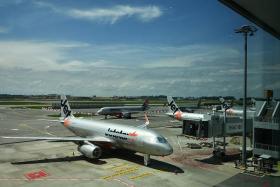What's the best way to book a holiday?
Travellers should evaluate direct booking and third-party options before making a purchase
All Mr Daniel Kruimel wanted was a convenient way to book cheaper plane tickets online.
He used travel search engine Skyscanner to buy a Malaysian Airlines ticket via Giamso Tours last month.
But when the e-ticket was issued Mr Kruimel, 32, a general manager in the IT industry, realised that he had entered his particulars wrongly when making the booking.
After some to-ing and fro-ing, Skyscanner paid for the administrative fees as a gesture of goodwill.
Mr Kruimel's case is not unique as many rely on third-party booking sites which often partner hotels and airlines and take a commission.
Professor Bjorn Hanson from the New York University's Preston Robert Tisch Centre for Hospitality and Tourism told The New Paper that third-party sites such as Expedia and Travelocity have become popular for the convenience they provide travellers who are searching for and comparing information, prices and availability.
But a recent survey by performance marketing company Criteo revealed that a slight majority - 52 per cent - of Singaporeans still prefer to book directly with airlines or hotels.
The top three reasons were that changing or cancelling bookings were easier (47 per cent), booking directly was usually cheaper (44 per cent) and habit (43 per cent).
A check on travel forums on Hardwarezone and TripAdvisor also revealed numerous complaints about the customer service of online booking intermediaries.
DIRECT BOOKING BENEFITS
Booking directly with an airline or hotel is usually cheaper, said Mr Chetan Kapoor, a research analyst for the Asia-Pacific at travel research firm Phocuswright.
Hotels normally offer three rates to travellers who book directly - a public rate with no discounts, a discounted rate for members of loyalty programmes and a discounted non-refundable rate, said Prof Hanson.
"Yet, almost always, one of those three will be as low or lower than the rate offered by an online travel agency, which will take a commission. That pushes up prices," he said.
There are also benefits tied to loyalty programmes of hotels, which allow them to build profiles, tune guest personalisation and offer other add-ons - which they may not distribute via third-party sites, said Mr Kapoor.
A key reason some consumers prefer to skip third-party sites is for quicker customer service, particularly those who need to make amendments to their bookings, said Assistant Professor Terence Fan of Singapore Management University, who specialises in transport.
"Sometimes third-party sites only have standardised description or terms - so customers should not expect any frills beyond what is specified in their offers," he said.
BENEFITS OF THIRD-PARTY TRAVEL SITES
Mr Kapoor said transaction-related issues have come down as the online travel market has matured.
"Primarily, travellers lose frequent flyer or guest loyalty points by booking with intermediaries but they don't seem to mind because finding the best price and deal is the most important factor when booking travel," he said.
Travel site Expedia's general manager for South-east Asia and India, Mr Simon Fiquet, acknowledges that errors are common and Expedia will resolve these issues through its customer support team with the least possible stress or cost to the customer.
He added that Expedia works with about 385,000 properties and 500 airline partners globally, and this allows it to offer bundled air and hotel packages that bring the biggest holiday cost savings to customers.
Dr Huynh Phung Huynh, co-founder of Justgola, a travel website and app that generates customised itineraries for travellers, said third-party sites can offer better prices due to their own promotions and loyalty programmes.
Prof Fan also said customers should consider all avenues to get the best deal.
Get The New Paper on your phone with the free TNP app. Download from the Apple App Store or Google Play Store now



